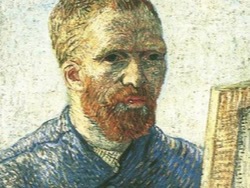
Everyone can quote a lot of famous people, has great creative potential and thus suffering from mental illness — take Vincent van Gogh, Virginia Woolf, Tony Hancock or Robin Williams. Examples are so many that the existence of a link between unhealthy state of mind and creative abilities seems obvious.
But here is the question: whether it seems to be common opinion data research? It turns out, all is not so simple, was discovered by the Explorer BBC Future.
In fact, reliable data on this issue is surprisingly thin. 15 of the 29 studies conducted in the period up to 1998, no connection between these phenomena has not been established, whereas in the other nine cases the link was discovered, and in the other five she was voted uncertain.
This can hardly be considered a confirmation of the direct relationship between mental illness and creativity.
Moreover, some of the studies were based on simple mapping encountered in the practice of cases, not serious attempts to identify a causal link.
One of the difficulties is that to define or measure creativity is not so easy, so scientists often use alternative indicators.
For example, in the study conducted in 2011, classification of participants was made simply by occupation, based on the fact that every artist, photographer, designer or scientist definitely has a creative potential, regardless of, what exactly is his job.
Using data from the official census of the population of Sweden, researchers found that among the representatives of this creative professions 1.35 times more common people with bipolar disorder (previously called manic-depressive psychosis), however, the symptoms of anxiety, depression or schizophrenia seen them in the same way as that of professionals in other sectors.
Is there a relationship between mental disorder and creativity, or is it a myth?
Because of this simplistic division, it is difficult to say whether these data mean that the representatives of creative professions are more prone to the risk of bipolar disorder, or what this disease develops extremely rarely, say, accountants.
In favor of the existence of interdependence between these phenomena often result published in 1987 the results of a study conducted by the American psychiatrist Nancy Andreasen.
In this study, we compared 30 writers and many other professions. Among the writers of people with bipolar disorder was higher.
However, the sample was very small — 15 years were interviewed only 30 writers, and although this study is often quoted, it has been criticized due to the fact that the diagnosis of mental disorders was carried out just on the basis of the interview and the lack of clear criteria (see comprehensive analysis of this and other commonly cited studies in the work of the American psychologist Judith Schlesinger).
Besides the discussion was people who knew who of the participants is a writer that could affect the results.
Moreover, the authors decided to visit the sanatorium for writers seeking solitude, so maybe there was just those study participants, who obviously had concerns.
Even if we accept the results on faith, they say little about the causal relationship between these phenomena.
Indicate whether research data, estimated that enhanced creativity as a result of bipolar disorder prompted the writers to choose this profession or that the symptoms prevented them to find regular work, is hard to judge.
In confirmation of the thesis about the link between mental disorder and creativity people often cite the results of two more studies.
The first was conducted by the American psychologist Kay Redfield Jamison, who became famous as the author of the fascinating book “the Troubled mind”.
This study was also based on interviews, this time with poets, novelists, biographers and artists. It was attended by 47 people, however, the control group was not provided, therefore, to compare its results only with averages among the population.
Jamison has set an unusually high level of mental disorders among the participants. For example, half of the poets at least once been treated.
Sounds impressive, but, as noted by critics, there are only nine respondents.
Another study involving a much larger number of people was conducted by the American psychiatrist Arnold Ludwig.
He studied the biographies of over a thousand celebrities in search of mentions of mental disorders and found that the symptoms of the disorders vary depending on the profession.
The problem here was that although famous people (for example, Winston Churchill and Amelia Earhart), no doubt, are exceptional, strictly speaking, they do not necessarily have extraordinary creative abilities.
Although this extensive research is often cited in confirmation of this interrelationship, Ludwig himself in his work, admits that he failed to establish any fact that mental illness was more common among prominent personalities, nor that they are a necessary condition of exclusivity.
But if the evidence is at best little or not at all, why then this belief so accustomed?
Apparently, the phenomenon of prominent personalities of considerable interest to scientists, but research on this topic did not always give the same results.
In 1904 the English doctor Havelock Ellis had studied more than a thousand people and found no relationship between mental illness and genius.
A similar conclusion was made on results of 19 studies of thousands of German artists and scientists for three-century period.
However, it should be noted that these studies have an important drawback: they are based on the assumption that biographers knew about the presence of mental disorders in the characters of his books and mentioned this fact.
But if the evidence is at best little or not at all, why then this belief so accustomed?
One reason is that intuitively it seems like thinking outside the box or a surge of energy and determination, which can be characteristic of a manic state, is able to create a creative mood.
Some argue that the relationship between mental illness and creativity is more complex that the disorder allow people to think more creatively, however, at the time of acute illness creative potential drops to average or below.
Of course, sometimes the problems with mental health can and does not let the man implement his plan. In the period of depression, the motivation quickly falls.
Perhaps many believe in the existence of such a relationship just because people are combining these characteristics usually draw attention to themselves. Lebanese psychologist Arne Dietrich offers an interesting explanation of this phenomenon based on the theory of “heuristic availability” formulated by Nobel prize-winning Israeli-American psychologist Daniel Kahneman.
The theory States that people tend to focus on what is directly in front of them.
Stories about how van Gogh in a fit of madness cut off his ear, and the decades-long debate about what is or isn’t then, make us vividly imagine the story.
However, in our imagination there are no similar stories about painters who lived happily ever after.
We tend to evaluate the probability of occurrence of an event based on how easily we can imagine it.
And if you ask anyone about whether there is a connection between genius and mental illness, he immediately will come to mind many examples in favor of this thesis.
It is possible that the belief in the presence of such a relationship may have certain negative consequences.
Some feel that the disease if really contributes to the creative impulse, and for this reason, even refuse to take medication, fearing, for example, lose their special abilities.
But is there not a risk it is a mistake to attribute their creative success to disease, and not your own talents?
And what about those who suffer from a mental disorder, but does not notice in himself any special talents? Will they, after hearing such statements, assume that we simply must do something exceptional, and worry if they will fail?
I think ultimately the popularity of this belief is due to the fact that it brings solace.
People suffering from a mental disorder, it gives hope that their disease may be a positive side (and over the years I have interviewed many people who told me about the advantages of his disease).
And mentally healthy people are comforted by the idea that if they had outstanding abilities, they would have to pay for them with their health.
Perhaps the relationship between mental disorders and creativity exists simply because we want it.








